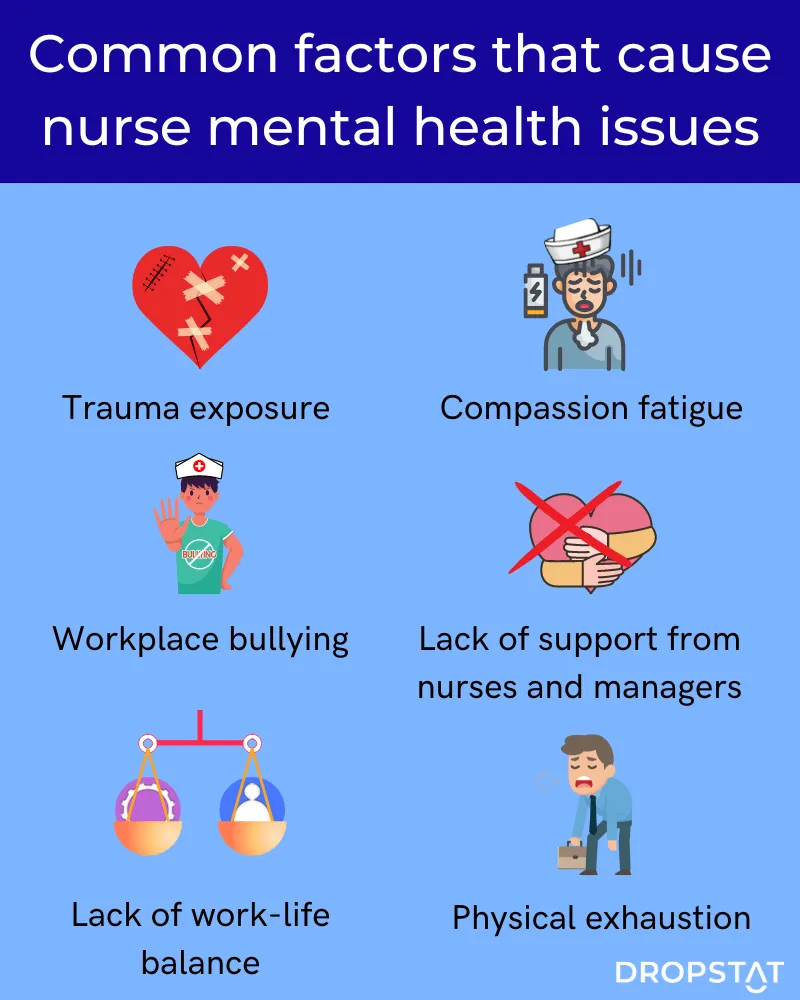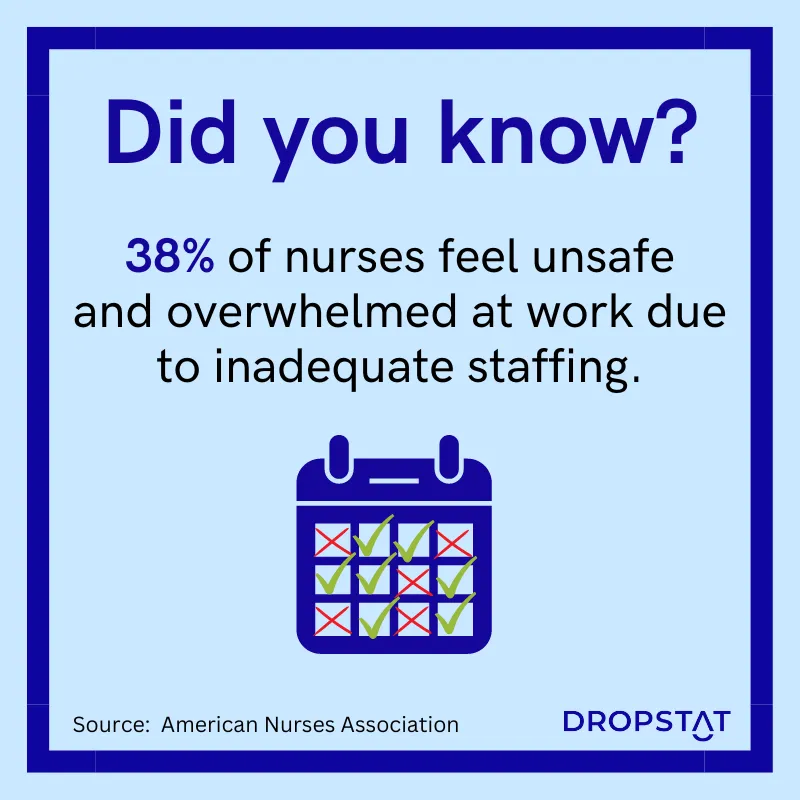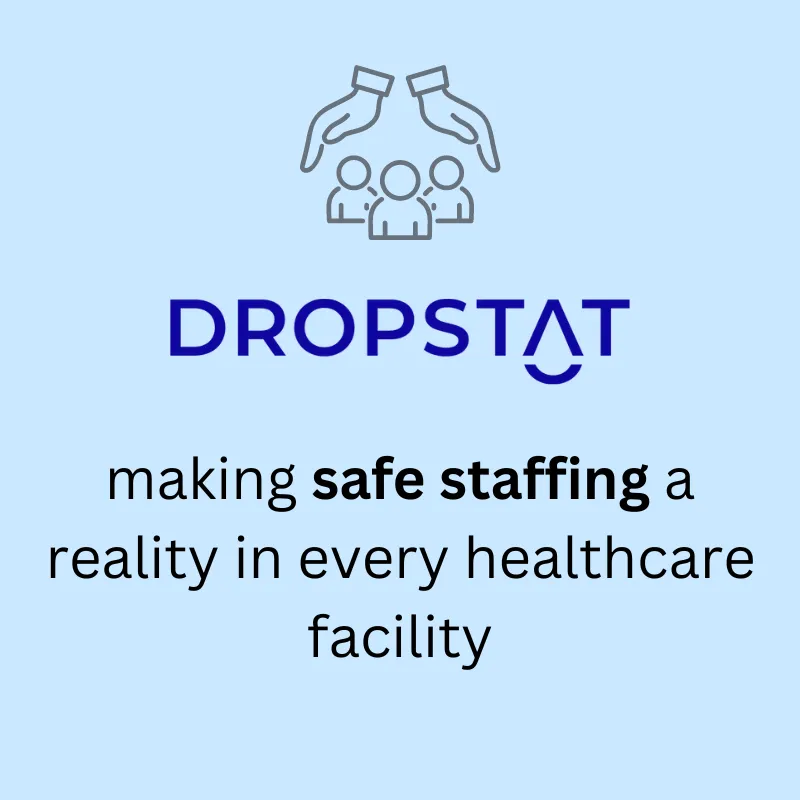Factors that harm nurses’ mental health
The constant physical and emotional demands in the nursing field often contribute to the declining mental health among nurses. Many healthcare workers face ongoing threats and challenges that add to worsening mental health outcomes; this includes:
- compassion fatigue
- poor workplace cultures and hazards
- workplace bullying and violence
- physical exhaustion
Although these are some of the main factors that harm nurses’ mental health, there are numerous additional causes that contribute to other mental health concerns as well.
Compassion fatigue is a major nursing challenge.
The nursing workforce often takes on the role of emotional support for their patients, which can become tiring and ultimately distressing. Compassion fatigue refers to the state of mental health when nurses become less compassionate toward their patients as a result of witnessing trauma and experiencing stress regularly. This also occurs when healthcare workers care for terminally ill patients, witness death, and assist patients with depression, PTSD, anxiety, or other mental health conditions.
Workplace cultures and their effect on mental health in nursing
The ability to rely on other healthcare workers is a reliable method that can be used to reduce mental health issues among healthcare professionals. However, when your healthcare facility lacks a strong, supportive, and welcoming workplace culture, nursing staff may feel unable to voice their concerns or struggles. In turn, this may culminate in feeling burnt out due to the emotional toll of the position and the hostile work environment. However, nurses’ mental health and well-being can be positively impacted by the support of peers and colleagues who have similar experiences and are, therefore, able to empathize with one another.

Workplace bullying and violence
Nursing leaders must prioritize establishing practices to reduce workplace bullying and improve the mental health of the workforce. Nurse bullying is often experienced through humiliating or offensive behavior, either verbally or physically. This recurrence contributes to emotional exhaustion and feelings of anxiety before even starting a shift. Additionally, acknowledging that nurses experience violence from patients can enable your institution to investigate the most common occurrences in order to institute evidence-based interventions.
Some ways that nurse leaders can address these issues is by emphasizing the significance of the bystander’s role in bullying, as well as handling reports of bullying with utmost diligence and efficiency. Mental health support and resources for mental health services can also assist healthcare workers who may not know how to seek support on their own. By providing these resources, your nursing staff is less likely to experience a mental health crisis due to the nature of their job.
Physical exhaustion can cause adverse mental health for nurses.
Increasing the length of shifts and creating nursing schedules that do not align with the personal responsibilities of your nursing staff is a significant factor in physical exhaustion among many healthcare workers. When nurses work overtime or consecutive shifts, their ability to keep to a healthy sleep schedule is diminished. Additionally, it may be more difficult to practice self-care or seek out a mental health professional to assist them. Attempting to reduce overtime and committing to a scheduling system that works for your healthcare workers is one way to mitigate physical exhaustion caused by the demands of nursing.

A healthy work-life balance can improve mental health in nurses
Irregular schedules within nursing make it very challenging for nurses to find a healthy work-life balance. When nurses lack the ability to plan for their personal lives, chronic stress becomes more prevalent. This may lead to poor mental health and physical symptoms related to anxiety and depression.
However, when your facility makes an effort to give your staff increased flexibility to plan for their personal responsibilities outside of their professional roles, job satisfaction increases, as well as nurses’ mental health. Some methods that can be used to increase scheduling flexibility for healthcare workers are to start scheduling shifts as far in advance as possible and to limit overtime which contributes to burnout.
Warning signs for mental health issues in nursing
Here are some common mental health warning signs that healthcare managers should look out for:
- Frequent absences: If a nurse is frequently absent or often calls in sick.
- Emotional instability: If a nurse displays sudden and extreme changes in mood or emotional instability.
- Decreased job performance: A nurse who is experiencing mental health issues may struggle with job performance, such as making errors, missing important details, or having difficulty concentrating.
- Withdrawal from social activities: If a nurse loses interest in activities that they previously enjoyed and isolates themselves.
- Physical symptoms: A nurse who is struggling with their mental health may display physical symptoms such as fatigue, headaches, or changes in appetite or sleep patterns.
- Increased irritability or sensitivity: If a nurse displays increased sensitivity and gets easily upset or angered by small things.
Warning signs that your facility is not doing enough to prevent mental health issues
Assessing your healthcare facility for the risk factors associated with poor mental health can reduce the prevalence of mental health issues among your nursing staff. Some warning signs that your facility is not doing enough to prevent mental health issues include;
- A culture of workplace bullying without a system to report these incidents,
- Scheduling nurses for consecutive shifts, which makes it harder for nurses to practice their own well-being,
- A lack of mental health promotion within your institution.
Healthcare leaders must be responsible for implementing effective resources that can be used to encourage employee well-being and reduce compassion fatigue.

6 Strategies to promote positive mental health among nurses
By recognizing the factors that contribute to poor mental health among nursing staff, your healthcare facility can provide your workforce with the necessary strategies to improve overall mental well-being. A few approaches to focus on improving the mental health of your staff include:
- Assess the work environment and workplace culture to create a greater sense of community and support.
- Appoint a chief wellness officer to take on the responsibility of providing mental health resources.
- Conduct wellness check-ins with individual nurses to foster more support and gather feedback about your care teams.
- Ensure that your scheduling and staffing practices take your staff’s needs into consideration to offer more balanced personal and professional lives for your employees.
- Emphasize limiting overtime to reduce physical exhaustion among your staff.
- Carry out programs to reward your nursing staff to show appreciation and validate their hard work. Recognition and gratitude are crucial to reducing poor mental health outcomes.
How Dropstat’s platform improves nurses’ mental health
Dropstat recognizes the importance of a strong focus on mental health within the field of nursing and the ways in which mental health issues can harm patient outcomes, employee satisfaction, and operational efficiency.
Dropstat’s integrated rewards system using Amazon gift cards offers nursing staff the recognition that they deserve for making an effort to pick up shifts and improve scheduling. By engaging with the platform, nurses can ensure safer staffing environments. This not only makes the facility a safer place for both nurses and patients, but it also provides staff with more flexibility to balance personal and professional responsibilities. Ultimately these practices reduce emotional exhaustion and chronic stress.
In addition to integrated rewards, nurses are able to specify their shift preferences which can be integrated into the scheduling system. Having your nurses’ preferences available allows your care team to organize schedules that align with your staff’s desires and improve mental health throughout your facility’s departments.
Taking your staff’s needs into consideration is a crucial part of building a positive work environment and supporting efforts to improve mental health. These practices enable nurses to balance their work-life responsibilities more easily and make time for family and friends with enough time to rest up.







